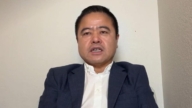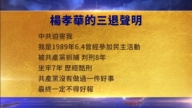【新唐人2013年04月08日讯】日前,“微信是否收费”的争议,成为大陆网路上最热门的话题。一方是“工业和信息化部”以及三大电信巨头主张的“肯定收费”,另一方是微信开发商声称的“不收费”。而有九成网友对收费表示抵触,并表示“收费就不用”。专家们则认为,这是一场垄断企业和民营企业之间的利益之争,不应该把成本转嫁给百姓来承担。
“微信”是大陆“腾讯公司”,于2011年1月 21号推出的一款手机聊天软件。可以通过网络快速发送手机语音短信、视频、图片和文字,支持多人群聊。
“微信”诞生两年多来,中国大陆用户已经突破3亿,直逼中国三大电信运营商,也造成了三巨头的收入大幅下滑。面临民企“腾讯”的威胁和挑战,国企运营商们终于“举起了手中的刀”。
3月31号,大陆《财经网》报导,“工业和信息化部”部长苗圩曾透露“微信有收费但不会大幅收费”。随后“工信部”决策层也明确对媒体表示:“微信收费是肯定,但具体如何收费还在研究中”。这一消息引发了大量微信用户的不满。
海南省大学生 小韩:“像微信已经以流量这个点在收钱了,就不应该再去收一份应用费。运营公司可能真的是没钱,或者穷疯了吧,才会想到这种主意吧,我觉得是很荒唐的一件事情啊!”
据《新华网》发起的最新调查显示,有九成以上网友表示﹕“如果微信收费将不会继续使用”。
北京民办教育机构负责人 张先生:“相对来说不赞同吧,因为肯定还有其他的软体可以用,并不一定非要用微信。那么如果收费收到一定的价格,大部分都没有人用了,那么我自己一个人在里边也没有什么意思。”
小韩:“我听说这个事情以后,我特别气愤你知道吗﹗本来我们上网用QQ、微信、人人网这些社交网路,第一是因为用户多,第二是因为不用收费。如果收费以后,我是不会继续使用了。”
最近,《中央电视台》在电视节目和官方微博上,对“微信收费”表示支持。《央视》举德国的“WhatsApp、Skype 等类似软体都有收费为例,引发网民的强烈不满。德国网民和留德学生反驳说﹕“用WhatsApp这么长时间了,从来就没再收过任何费用”、而“skype是免费的,除非进行网外通话”。
也有评论人士在微博表示,中共政府有两件武器,一个是国际惯例,一个是中国特色,视需要而决定使用哪件武器。
小韩:“你不能和其他国家比啊,我们人均收入没有别人高啊,人家消费水平肯定比我们高,如果一定要与时俱进的话,德国还有高网速、宽网速、德国那些话费服务、流量服务都是包月服务的。”
4月7号,“中国计算机学会”在网上发表声明,反对中国三大运营商对微信收费,受到了众多网民和业内人士的支持。
中国计算机学会:“他存在这种双重收费的问题,因为工信部或者是运营商已经收了网路流量费了,但是针对微信,他还要在这个基础上收取一些其他的费用,我觉得就是双重收费了”
三大运营商主张“微信收费”的一大理由是,3亿微信用户大量占用了网路的所谓“信令资源”,使得基础电信网路瘫痪,可能引发“信令风暴”。众多业内专家则认为,微信不足以造成“信令资源”紧张,而且国外的电信运营商都是通过技术创新和加强自身网路基础建设,解决这类问题。
中国计算机学会:“这个信令事件的话,全球也只有那么几例,而且至今为止,我们也没有看到数据说明由于微信造成了它的瘫痪。我觉得这个可能是跟他的收费…可能找一些借口吧!”
通讯专家分析,从目前网民和业内人士普遍反对“微信收费”的舆论声浪来看,很可能最后是由三大电信运营商向“腾讯公司”收费,而不是向普通用户收取双重费用。
采访编辑/张天宇 后制/葛雷
Chinese Netizens Against WeChat Users’ Fee
Recently, the hottest online topic in China is the question,
should WeChat mandate a fee on mobile messaging service.
On one hand, the Ministry of Industry and Information
Technology (MIIT) and three telecom giants insist that WeChat has to charge users.
On the other, the developer of WeChat claims
that the application will still be free.
Over 90% of Chinese netizens are against the fee,
saying they will not use WeChat if it is not free.
Scholars remark, this is a battle of monopolies and private
enterprises, and users should not be made the scapegoat.
WeChat is a mobile phone text and voice messaging
service developed by Tencent, launched on Jan 21, 2011.
Its users can send text, voice, photo or video messages
to mobile phones via Internet; it also supports group chat.
Two years since WeChat was launched in China,
and its subscribers have already exceeded 300 million.
It almost caught up with China’s three telecom giants,
which revenues have dropped sizably as a consequence.
Faced with this challenge of Tencent, a private enterprise,
the state-owned service providers whipped out their “guns”.
On Mar 31, China’s finance network Caijing.com.cn
cited words from Miao Wei, the MIIT minister.
Miao said, “WeChat will charge the users,
but only at a moderate level.”
Later another MIIT leader also told the media,
“WeChat will definitely mandate a fee; details of the charging plan are still under discussion.”
This news was then commented upon,
with numerous complaints from WeChat users.
Xiao Han, undergraduate from Hainan: ”WeChat users
are already being charged for the Internet usage.
So there should not be an additional fee
for applications.
Are the telecom companies that poor, so they came up
with such a crazy idea? I think this is simply ridiculous.”
An online survey of Xinhua showed, over 90% of netizens
say they will not use WeChat if there is a fee mandated.
Mr. Zhang, director of Beijing’ private education institution:
”Relatively speaking I do not agree with the charging plan.
There are always other free applications available,
the users don’t have to use WeChat.
If the fee is at a level that most users will stop to using it,
there will be no reason for me to stick with it too.”
Xiao Han: ”I become very angry after hearing this news.
We use applications like QQ, WeChat and social networks.
SInce first, they have many uses, and second, they are free.
If a fee is mandated then I will not use them anymore.”
Lately, the CCTV showed its support on the charging plan
both on its official microblog site, and on its TV programs.
The party’s mouthpiece claims, the users in Germany
have to pay a fee for using “WhatsApp,” “Skype,” and other messaging or telecom applications.
Chinese netizens then strongly criticized the CCTV,
saying that its “evidence” is false.
Netizens and Chinese students in Germany said, “We aren’t
charged by WhatsApp, except for application’s initial fee,”
“Skype is totally free,
unless you call someone outside its network.”
Some commented, the Chinese Communist Party (CCP)
uses two “weapons” as an excuse for its actions.
“International traditions,” or “Chinese characteristics,”
choosing whichever serves it better in each situation.
Xiao Han: ”You cannot compare China
with other countries (such as Germany.)
Our average income is not as high, so their levels
of consumption are higher than ours for sure.
If we really want to catch up with them, we should look
at Germany’s high-speed Internet, low-price phone service, and monthly-fee Internet usage.”
On Apr 7, China Computer Federation (CCF) made a public
announcement online, opposing China’s telecom giants fee over WeChat users.
Many netizens and industry insiders then showed
their support towards CCF’s announcement.
China Computer Federation: ”Here we have the issue
of double charge, as the MIIT or telecom service providers already charge fees by Internet usage.
Thus, if other fees are further mandated to WeChat users,
we believe this is definitely a kind of a double charge.”
China’s three telecom giants argue, the most important
“reason” for the fee is that the 300 million WeChat users consume significant signaling resources.
This paralyzes the basic telecom network,
and may even lead to “signaling storm,” they claim.
Experts however remark that WeChat is not able
to cause shortage of signaling resources by itself.
Furthermore, foreign telecom providers focus on technical
and network innovations to solve such problems.
China Computer Federation: ”Even globally, only a few
signaling resource problems have ever happened.
In addition, we have yet to see any data which proves
that WeChat really paralyzes the telecom network.
Therefore we think this may simply be an excuse
for them to charge WeChat users.”
The experts conclude, considering the strong opposition
by netizens and the industry against the charging plan,
the three telecom giants will probably charge Tencent,
rather than “double charge” the WeChat users directly.





























